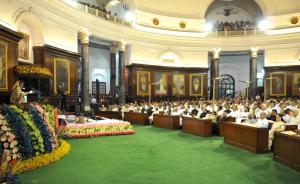First Lok Sabha speaker Sumitra Mahajan announced the suspension of 25 Congress MPs for the logjam in functioning of parliament. Then Congress president Ms Sonia Gandhi termed it “black day for democracy.” Today, the rest of the opposition parties, barring Trinamool Congress, have joined Congress in the boycott. Where does it leave India’s voters who carefully weigh their option before sending their representatives to the nation’s supreme legislative body?
All of us are aghast at the manner our representatives (non)function in parliament. The real democracy would happen when the people have the option to remove or de-elect MPs before the end of their term of office. You don’t perform and people recall you. Simple. In India though, this power is not granted to the citizens either by the Constitution or by a statutory body. This power entirely rests with the parliament alone.
Thus the continuation of representatives in office till the end of their term is not with the people. Even though the power to elect them lies directly with them. Once they are selected, people lose any control on their accountability. Till their next five-year term beckons.
In the United States, there are a few examples of a successful recall process. Their constitution does not make provisions for the recall of US senators, representatives to Congress or the president or vice-president of the country. But in some states, recall efforts against state legislators happen from time to time. The Reform Party of Canada has recall as a part of its political agenda. In Uganda, the constitution itself provides the right of recall to its citizens. In Guyana, the recall power is not with the electorate but with the parties in Guyana. In Switzerland, the provisions for recall currently exist but are seldom used. Venezuela, where the president is elected directly and may be recalled, the system is applied very broadly.
Countries like Sweden, New Zealand, Zambia and Germany are also reported to be considering the recall system in order to ensure accountability of elected representatives of the people.
Recall process offers another benefit. It re-engages citizens with politics and democracy. The two inherent options could be horizontal or vertical accountability. Horizontal is effected by regulatory and other supervisory bodies which are composed of officials acting on behalf of the people. Vertical accountability is mandated by the public itself through various mechanisms, including elections, complaint process, legal redress, watchdog groups etc. A combination of both is best advised.
Parliament too must adopt certain measures to ensure members are present and conduct themselves well. MPs should be monitored by an independent official body which should report to their respective parties about their conduct.
The mockery begins from the day the people in nearly all cases are offered choices. The candidates they are offered are not their own selections. The candidates are different parties’ choices. It’s not as if the candidates have raked up sizeable achievements. They are rather thrust upon the people.
For the moment, brace yourself for the pandemonium in Upper House Rajya Sabha where Congress is in absolute majority. Be rest assured, Ms Gandhi wouldn’t then find it a “Black Day in Democracy.”


